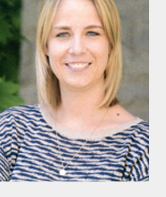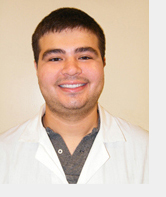Graduate and Postdoctoral
Related Links
Alumni
Phaedra Henley
 "Phaedra Henley, PhD, says that spending time in developing communities has changed the way she sees her own life.
"Phaedra Henley, PhD, says that spending time in developing communities has changed the way she sees her own life.
Henley conducted field work in two Canadian First Nations communities as well as a large slum community in Kenya. She says it made the stress and worry in her own life seem less significant. "Whenever I am feeling anxious and stressed out, I just think about what others have to deal with just for day-to-day survival," she said.
Henley's ecosystem health research involved the active participation of the communities in which she worked and has shown that fairly small changes can have a big impact on human health. By working closely with the populations in Walpole Island, Attawapiskat and a large Kenyan community surrounding Lake Naivasha, Henley explored the relationship between health, stress and exposure to environmental contaminants in these developing communities.
"The overarching conclusion that we reached is that knowing the real relationship between exposure to environmental contaminants and health risks will allow people to decrease their exposure and decrease their stress," she said.
Using hair as way to measure both chemical exposure and stress levels, Henley evaluated the relationship between actual environmental contamination and what she referred to as "chemophobia" or a fear of chemicals.
What they found is that people in the two Canadian reservations — Walpole Island and Attawapiskat — had higher levels of both contaminants and stress levels when compared to a representative sample of the Canadian population. In the Kenyan population, while the stress levels were higher, the data showed that their fear of being exposed to pesticides from the robust flower farm industry, were actually unfounded.
"This type of community-based study relies on an active partnership between the investigators and the community," she said. "The overarching goal of an ecosystem health project is sustainability and you can't really create practical solutions in a community without knowing what's appropriate in the community," she said."
Phaedra Henley, PhD, Pathology
Postdoctoral Fellowship, Department of Biology, Western University
Michael Ruiz
 "Graduate Studies in the Department Pathology and Laboratory Medicine allowed me to gain an understanding of basic science research in a personal and supportive environment. I was able to learn a variety of cell culture and analysis techniques to answer my own research questions. My supervisor and advisors embraced my ideas and allowed me to explore my interests. From them I learned that the method in which you ask the question is very important, and often that the control groups are just as vital as the experimental treatments you are most curious about. I was also given many opportunities to present locally and internationally. In particular the international experience was important for me to share my ideas and gain an appreciation for the array of research that is conducted worldwide. Refining my presentation skills has been a major takeaway from my graduate school experience. Furthermore, I was able to publish two review articles, one as first author, and was able to assist lab mates with their articles. Right now I am in the process of trying to publish my first research article based on my graduate school research. Finally, I am currently at the University of Toronto pursuing a Medical Doctorate to continue along my desired career path to be a clinician researcher. The skills, knowledge and conviction I gained as a graduate student in the Department of Pathology and Laboratory Medicine will be vital to me attaining this goal."
"Graduate Studies in the Department Pathology and Laboratory Medicine allowed me to gain an understanding of basic science research in a personal and supportive environment. I was able to learn a variety of cell culture and analysis techniques to answer my own research questions. My supervisor and advisors embraced my ideas and allowed me to explore my interests. From them I learned that the method in which you ask the question is very important, and often that the control groups are just as vital as the experimental treatments you are most curious about. I was also given many opportunities to present locally and internationally. In particular the international experience was important for me to share my ideas and gain an appreciation for the array of research that is conducted worldwide. Refining my presentation skills has been a major takeaway from my graduate school experience. Furthermore, I was able to publish two review articles, one as first author, and was able to assist lab mates with their articles. Right now I am in the process of trying to publish my first research article based on my graduate school research. Finally, I am currently at the University of Toronto pursuing a Medical Doctorate to continue along my desired career path to be a clinician researcher. The skills, knowledge and conviction I gained as a graduate student in the Department of Pathology and Laboratory Medicine will be vital to me attaining this goal."
Michael Ruiz, BMSc, MSc Pathology 2014
MD Candidate 2016/University of Ottawa
Caroline Trieman
"Graduate studies in Pathology was an essential part of my pre-medical educational experience at Western. Through the program, I acquired an appreciation for critical analysis of scientific literature. The program taught me how to become an effective communicator of my ideas, while also helping me to practice and hone the skills essential for effectual collaboration. The program helped to bridge the transition from being a successful learner in undergrad to becoming an effective critical thinker in my current medical studies. In medicine, the importance of evidence-based approaches to therapy is rapidly becoming a major determinant in patient care. Therefore, the skills I acquired during my time in graduate Pathology will only further continue to serve me well, both in the course of my study and in establishing diagnoses and treatment plans as a future physcian."
Caroline M. Trieman, BMSc, Schulich Medicine & Dentistry,
Western University, Class of 2010
MD Candidate 2016/University of Ottawa








